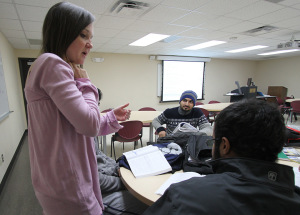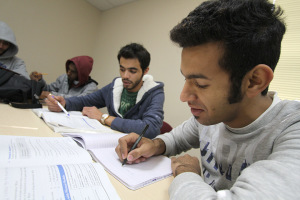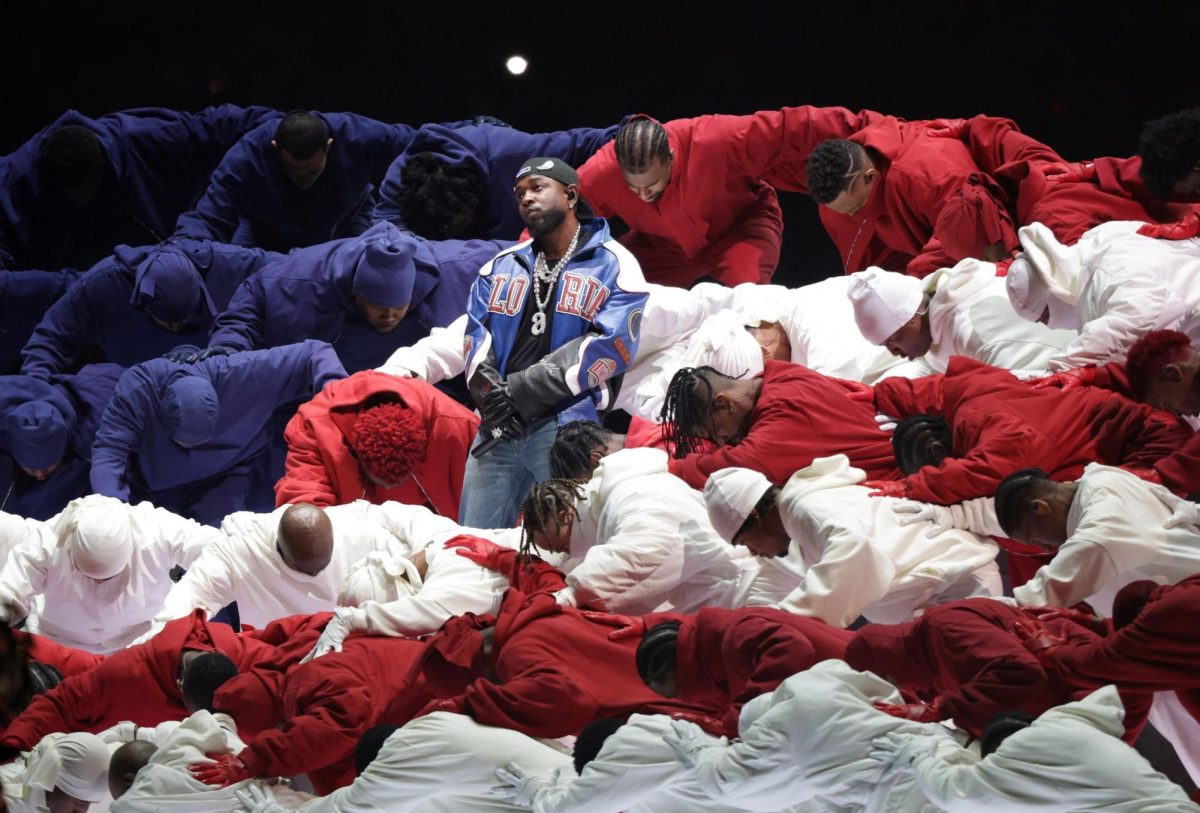
One by one the students entered the room with smiles and greetings for their instructor. They each pulled out their books and began participating in discussions like any other class. But this isn’t like any other class. This is an English course for international students who don’t know much English, but they must learn it without ever speaking their native language in class.
“We try to keep translations to an absolute minimum because these students have come here to the United States because they want to be immersed in an English language program and an English speaking country. If they wanted to be in a program where they were speaking their own language all of the time, they could have done that without travelling thousands of miles from home,” Brittany Norman, Intensive English Language Institute instructor, said.
This complete immersion into learning English is all part of a program called the Intensive English Language Institute, a pre-academic English program created in the early ’90s to help international students who haven’t passed certain English requirements to attend MSU. These students from all over the world — including Saudi Arabia, China, Vietnam, Italy, Ethiopia, Germany, Spain, and Haiti — must first pass the institute’s classes before applying to MSU. Although they’re not officially MSU students yet, they’re still allowed limited access to certain facilities by the tuition and fees they pay.
Nawaf Almutairi, future student in mechanical engineering, is a 24-year-old Arabic international student who came to MSU 11 months ago with the hopes of getting a great education.
“When you study in USA that’s going to be good in my country. Good future. But when you get a graduation in USA, that’s a big deal in my country,” Almutairi said while confidently speaking in English.
Yet, when Almutairi came to the U.S. he only knew how to say two words.
“When I come here I would just say yes or no. I think you remember that,” he said as he smiled and looked at his instructor Norman.
She laughed and said, “Yes. He was in my class his first term. It was a level two class, but we didn’t have a level one that year, so it was a mix. He had a lot to learn but he learned very quickly. Most of the students learn very quickly once they get into the program, if they want to learn of course because it’s a very intensive program, it’s a lot of hours, and it’s a lot of work, but it’s a lot of opportunities to learn too.”
Saleh Alharqi, future criminal justice major, is another Arabic international student who’s been in the program for four months and has the same goal of learning English and graduating from a school in the United States.
“It’s the first language of the world. You can use English for many countries. If I learned it in my country; I just talk English in school, not in the street with my friends. You can learn English more in USA than my country,” Alharqi said.
When he arrived in America, he too only knew a few words.
“I felt sad when I came here the first time. I didn’t know how to explain to someone so I just used my hands to make the person in front of me understand what I want,” Alharqi said.
“While these students do not come from English-speaking countries, many of them have a basic knowledge when they arrive. Our instructors take that knowledge and create a curriculum that promotes a safe environment to practice new skills and concepts,” Ashley Campana, Program coordinator of the Intensive English Language Institute, said.

Norman said, “There’s no way I would be able to translate for all those languages. We just take it slow and build from what English they do know. Sometimes it requires us to do some searching for definitions that they understand. Sometimes we have to do a little extra reading, or provide contextual materials like showing a video to give some visuals or I’ll find some pictures to go along with it and will discuss pictures. Eventually we’ll reach common ground.”
Learning the English language, just like any other language, can be a long, and hard process, one that these students are diving into head first.
“I think this class is the most one to help us speak faster and understand more. The only worst part is the short time I think,” Alharqi said.
Although some students may feel like their classes, for which the Saudi Arabian students have to pay out of pocket for the first four months and then the Saudi Arabian government pays after that, aren’t long enough, they still manage to get a learning experience by being here.
“Every time I study because when I don’t have homework, I watch movie, or buy some music, or get in a conversation with anyone. All the time I study,” Almutairi said.
On top of moving to a new country and not knowing the language, these students also deal with the challenges of being a college student.
“I have to wash my clothes by myself. I have to cook. I have to drive to my school. I have to do everything by myself. In my country my father help me, my mother my brother, my uncle, my friends, but here, when I came here I came alone, I didn’t know anyone here,” Alharqi, 21, said right before his friend interrupted.
“And right now you made a lot of friends,” Almutairi said with a smirk on his face.
“Ya I made a lot of friends,” Alharqi said as a smile lit up on his face
These students also experience a change in culture.
“There are so many differences in culture. When I meet my friends we shake hands,” Alharqi said as he shook his friends hand and kissed him on the side of his cheeks.
Referring to his friend’s handshake, Almutairi said, “Sometimes we do it here, but I’m scared someone might stereotype us.”
Campana said, “Whatever MSU can do to make these students feel that MSU is their home away from home would mean a lot to our program.”
From handshakes to worrying about laundry, these 2 students, along with the other 48 students in the program this term, also get to develop friendships with students from all over the world.
“Every day I get to witness students from across the globe strengthen their English skills to maintain a friendship with another student from the other side of the world,” Campana said. “They sit side-by-side and share stories, give presentations together, learn about one another, share their experiences — not to mention ethnic food that represents their countries — all in the name of education. They learn to connect through English as a shared language. These students are here to learn — about American culture as well as all of the cultures we proudly represent in IELI.”
















